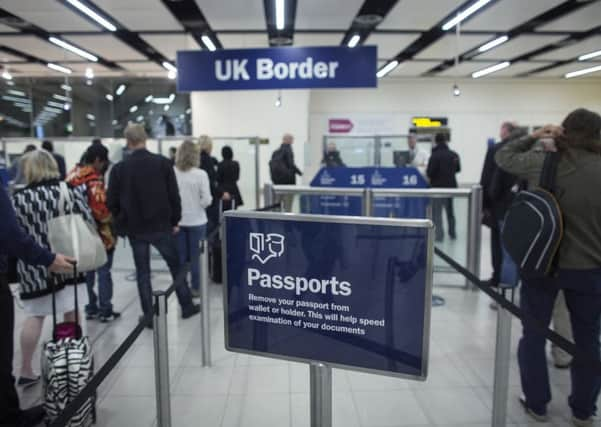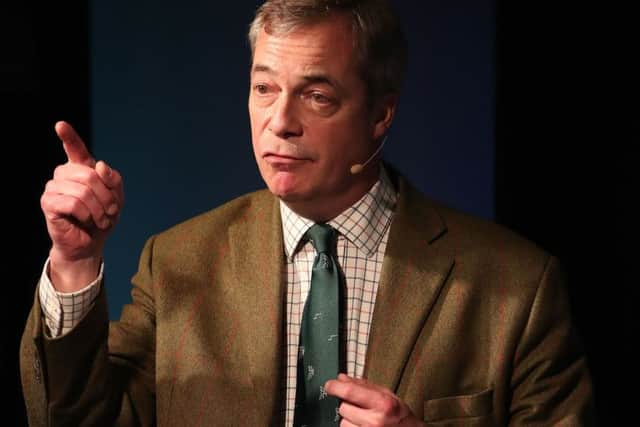Immigration must form part of political debate ahead of General Election - Jayne Dowle


Considering that immigration influenced the views of so many people in the EU Referendum only three short years ago, it does seem odd that the issue has been pretty much under the wire since election campaigning got underway. Mr Farage intends to change this and is expected to start laying out his party’s views and plans in detail this week. You can understand his reticence to keep it on the back burner until now.
Advertisement
Hide AdAdvertisement
Hide AdDuring the referendum campaign, as the then-leader of Ukip, he was widely condemned as anti-immigrant and castigated for his ‘breaking point - Europe has failed us all’ billboard campaign, which showed a huge crowd of young male refugees seemingly massing at our border. He may have trenchant views, but he is not entirely blind to political nuance. Just because a person supports Brexit does not mean that they are anti-immigrant. The debate needs careful handling, which is why he has been testing the water with the spurious narrative that public services are under pressure because of ‘over-population’.


He’s also saying that this is being felt the hardest in blue-collar Labour heartlands, particularly in the North, where the Brexit party is fielding a raft of candidates to pick up disenchanted Labour voters who can’t quite bring themselves to vote Tory. His stance needs challenging; there are many reasons why it is difficult to get a GP appointment in Barnsley or Bradford, for example, and they do not all have their roots in immigration.
Swingeing central government cuts which have reduced the availability of services, the contributory factor of long-ingrained poverty to chronic ill-health and the difficulty in recruiting doctors to less-than-favoured Northern towns and cities should also be taken into consideration. Who’s going to challenge it then? For this, we should be looking at the three main parties, Labour, Conservative and Liberal Democrat. They should be working on marrying up their own hitherto broad brush immigration manifesto pledges with details which address some of the concerns which Mr Farage has helpfully highlighted for them.
Boris Johnson should be credited for injecting a more liberal tone; his proposals for a fast-track visa for NHS professionals and post-study work routes for international students are sensible and actually address some of the concerns Mr Farage is highlighting about the health service.
Advertisement
Hide AdAdvertisement
Hide AdA firm but fair hand on the tiller seems to be the thing. Labour, on the other hand, would be set to steer immigration entirely in the opposite direction from Theresa May’s ‘hostile environment’. Closing the Yarl’s Wood and Brook House detention centres, repealing the 2014 Immigration Act, including the right-to-rent landlord checks, and tackling the exploitation of migrants in the workplace are all on their agenda.
The Liberal Democrats’ manifesto also sets out a number of proposals marking a decisive break with the status quo, including maintaining freedom of movement and ensuring that asylum seekers have the right to work in the UK after three months.
With less than a fortnight to go, and Mr Farage revving up his engines, we should be hearing much more about all of the above. The trick – I think – is not to consider ‘immigration’ in isolation. Whilst it is clear that each party needs to set out its stall in terms of legislation and government policies, what will really light up the issue is a recognition that it’s all about people.
Advertisement
Hide AdAdvertisement
Hide AdPoliticians should certainly steer away from making assumptions, especially about white British working class people living in Northern towns and cities. Go into many of our region’s schools, colleges and universities, for instance, and you’ll find young people of all ethnic backgrounds happily coalescing together.
They’d love to talk about immigration. However, they would love to talk about immigration in a way in which they are not asked to take sides or find hatred for their neighbour. And this is not limited to the idealism of the young either. You’ll find it in too in many workplaces, social clubs, football teams, exercise classes, anywhere really. We’ve moved on and forwards, but has the political debate? The clever politician should also recognise that we are not generally a country of extremes.
Great Britain is known for its tolerance and pragmatism; whatever our country ends up looking like in years to come, we should make these qualities our abiding principles. We could set an example to the world as far removed from President Trump’s as possible. This however, will only happen if the issue of immigration comes out into mainstream political debate and people are encouraged to start engaging properly with it. Let’s not leave it to Mr Farage to do all the talking.